Exercise effects on motor and affective behavior and catecholamine neurochemistry in the MPTP-lesioned mouse
- PMID: 20472000
- PMCID: PMC2902645
- DOI: 10.1016/j.bbr.2010.05.009
Exercise effects on motor and affective behavior and catecholamine neurochemistry in the MPTP-lesioned mouse
Abstract
This study used 1-methyl-4-phenyl-1,2,3,6,-tetrahydropyridine (MPTP) in mice to determine if exercise improves behavior and dopamine (DA) and serotonin (5HT) content. Male C57BL/6 mice received MPTP (4 x 20mg/kg) or saline. They remained sedentary or exercised by treadmill or voluntary running wheel for 6 weeks (n=8/group). Saline-treated mice ran significantly faster on running wheels (22.8+/-1.0m/min) than on treadmill (8.5+/-0.5m/min), and MPTP lesion did not reduce voluntary exercise (19.3+/-1.5m/min, p>0.05). There was a significant effect of both lesion and exercise on overall Rotarod performance (ORP): MPTP lesion reduced ORP, while treadmill exercise increased ORP vs sedentary mice (p<0.05). MPTP increased anxiety in the marble-burying test: sedentary lesioned mice buried more marbles (74.0+/-5.2%) than sedentary controls (34.8+/-11.8%, p<0.05). Conversely, exercise reduced anxiety on the elevated plus maze. Among saline-treated mice, those exposed to voluntary wheel-running showed an increased percent of open arm entries (49.8+/-3.5%, p<0.05) relative to sedentary controls (36.2+/-4.0%, p<0.05). Neither MPTP nor exercise altered symptoms of depression measured by sucrose preference or tail suspension. MPTP significantly reduced DA in striatum (in sedentary lesioned mice to 42.1+/-3.0% of saline controls), and lowered 5HT in amygdala and striatum (in sedentary lesioned mice to 86.1+/-4.1% and 66.5+/-8.2% of saline controls, respectively); exercise had no effect. Thus, exercise improves behavior in a model of DA depletion, without changes in DA or 5HT.
Copyright (c) 2010 Elsevier B.V. All rights reserved.
Figures
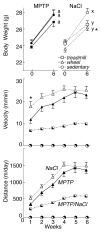
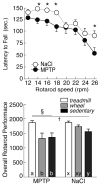
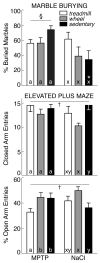
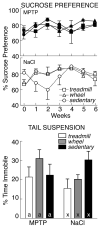
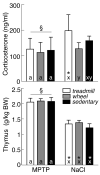


References
-
- Babyak M, Blumenthal JA, Herman S, Khatri P, Doraiswamy M, Moore K, Craighead WE, Baldewicz TT, Krishnan KR. Exercise treatment for major depression: maintenance of therapeutic benefit at 10 months. Psychosom Med. 2000;62:633–638. - PubMed
-
- Barbour KA, Blumenthal JA. Exercise training and depression in older adults. Neurobiol Aging. 2005;26 (Suppl 1):119–123. - PubMed
Publication types
MeSH terms
Substances
Grants and funding
LinkOut - more resources
Full Text Sources
Medical
Miscellaneous

